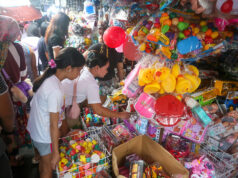Palay purchase program attracts 10 more provinces
TEN MORE local government units (LGUs) have committed to directly procure and distribute palay, or unmilled rice, from domestic farmers to address the gap in the market after traders started offering low prices in response to the large volume of exports.
In a statement, the Department of Agriculture (DA) said that the LGUs of Kalinga, Mountain Province, Marinduque, Iloilo, Capiz, Bohol, Biliran, Zamboanga Sibugay, Sarangani and Agusan del Norte have committed to purchase palay from farmers at “fair” prices after the market for domestically-produced rice softened after the implementation of the Rice Tariffication Law.
The Philippine Statistics Authority (PSA) reported that in the fourth week of September, the average farmgate price of palay dropped 0.9% to P15.82 per kilogram (kg) week-on-week.
Initially, 13 provinces — Isabela, Nueva Ecija, Ilocos Norte, Ilocos Sur, La Union, Pangasinan, Nueva Vizcaya, Quirino, Tarlac, Pampanga, Bulacan, Cagayan, and Bataan, were part of the direct-purchase scheme. In total, 23 provinces have committed P4.95 billion and plan to process and market of palay purchased from farmers.
The government’s strategy for countering the price decline is to spend public funds to prop up the market after private traders turned reluctant to buy.
“Our efforts to partner with our provincial governors is now coming into fruition as we jointly help prop up palay prices. Through this, we hope to provide a sure market for the produce of our rice farmers at a fairly competitive price at least for this season in these provinces,” Agriculture Secretary William D. Dar said.
The National Food Authority (NFA) typically serves as a buyer of last resort for palay, the form in which farmers sell their crop, but it cannot buy the entire harvest at current funding levels. It pays P19.00 per kg, well above the single-digit prices reportedly offered by private traders.
Mr. Dar added that the LGUs are also in the process of designing loan programs to support farmers, known as Palay sa Lalawigan, backed by Land Bank of the Philippines (LANDBANK).
“We are closely working with LANDBANK to provide loan schemes that are easily accessible with minimal or no interest to our farmers affected by low farmgate prices. We are trimming down the requirements to attract more farmers to avail of these loans,” Mr. Dar said.
He also encouraged other provinces with limited budgets to avail of loans from LANDBANK to finance the acquisition of drying facilities and to seek assistance from the NFA for palay storage. — Vincent Mariel P. Galang



